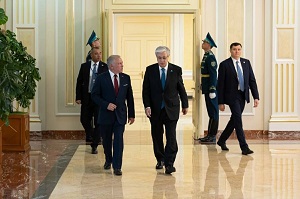Experts applaud investor citizenship policy as ‘strategic’ move to stimulate Jordan’s economy
AFP
AMMAN — In a strategic shift aimed at bolstering foreign direct investment (FDI) and accelerating economic development, the Jordanian government has updated its framework for granting citizenship and long-term residency to foreign investors.
The move, which aligns with the national Economic Modernisation Vision (EMV), has been met with strong support from former ministers and economic experts who view it as a catalyst for deeper capital inflows and long-term economic stability.
Former minister of economy Yousef Mansour described the decision as a “pivotal step” in enhancing Jordan’s appeal to serious investors. He noted that the policy strengthens investor confidence and positions the Kingdom as a secure destination for long-term capital.
“Jordan has historically succeeded in attracting significant investment, particularly from France and Kuwait,” Mansour told The Jordan Times. “This initiative builds on that track record by providing investors with a sense of permanence, which in turn stimulates economic engagement through increased production and consumption.”
Mansour further highlighted that the majority of investors since 2004 have come from countries like Syria and Iraq, often as a result of regional instability.
“Cultural affinity plays a crucial role in encouraging investors to commit,” he said. “When citizenship is offered, the level of economic activity naturally rises — not only in terms of capital investment, but also in day-to-day consumption and long-term project development.”
A Strategic Enabler of Economic Transformation
Echoing Mansour’s views, former minister of industry and trade Ahmad Thougan Hindawi welcomed the Cabinet’s recent decision to renew and reinforce Jordan’s investor citizenship programme, describing it as “a bold step towards Jordan’s economic renaissance.”
“This policy is not merely an incentive, but a strategic enabler of Jordan’s broader economic vision,” said Hindawi. “It enhances our competitiveness, stimulates job creation, and directly supports the pillars of the Economic Modernization Vision.”
He noted that the sectors poised to benefit most include information technology, tourism, healthcare, pharmaceuticals, agritech, renewable energy, and logistics.
“These are sectors where Jordan can build strategic advantage,” he said. “They also align with the global shift toward innovation, sustainability, and knowledge-driven growth.”
“Jordan is signalling to the world that it is open for credible partnerships,” he noted. “This programme sends a clear message: we are stable, ready, and willing to co-create long-term prosperity with global investors.”
Regulatory Framework: Pathways to Citizenship
The updated regulations, approved by the Cabinet under Prime Minister Jafar Hassan, define clear mechanisms for investors to obtain citizenship or long-term residency. The policy provides multiple pathways, depending on the type and scale of investment.
Under the first option, foreign nationals can obtain citizenship by investing at least JD1 million in newly issued, non-mortgaged shares in Jordanian companies through licensed brokerage firms.
The investment must be made within four months of government approval and held for at least three years. To prevent over-concentration, no more than 20 per cent of the investment may be allocated to a single company.
A second route allows for the establishment of new productive projects with a minimum capital of JD700,000 in Amman or JD500,000 in other governorates, creating at least 20 jobs in the capital or 10 outside.
These jobs must be verified by the Social Security Corporation. Eligible investors are granted temporary residency, followed by a three-year temporary passport, and full citizenship upon meeting the terms.
A fourth track rewards long-term investors who, over the past three years, have maintained fixed assets averaging JD700,000 (or JD350,000 outside Amman) and consistently employed at least 20 (or 10) Jordanian workers.
Citizenship eligibility extends to the investor’s immediate family — including spouses, unmarried sons under 24, and unmarried, widowed, or divorced daughters. For investments exceeding JD2 million, eligibility expands to include sons under 30 and their spouses and children.
According to the Ministry of Interior, 531 foreign investors obtained Jordanian citizenship through the programme by the end of 2024.
Each application is reviewed by a specialised technical committee under the Ministry of Investment, which coordinates with other relevant government entities before submitting recommendations to the Cabinet for final approval.
Tal: Citizenship Must Be Accompanied by Reform
While praising the policy’s intent, economic analyst Raad Tal warned that citizenship alone is not a silver bullet. He described the move as “a useful tool” to attract capital, but stressed that long-term success depends on creating an enabling business environment.
“Investors seek more than legal privileges — they want transparent governance, policy continuity, and a strong return on investment,” Tal said.
He called for complementary reforms to enhance the investment climate, including streamlined regulatory procedures, full digital transformation, and reduced operational costs. He cited the UAE, particularly Dubai, as an example of a country that paired investor residency schemes with sweeping structural reform.
Tal identified several key growth sectors for Jordan, including renewable energy — especially solar, given Jordan’s natural advantage — and ICT, where a skilled workforce and low operational costs provide a competitive edge.
He also highlighted export-oriented manufacturing, medical tourism, and smart agriculture as areas of growing investor interest.
A Shift in Investment Sources and Strategy
Historically, Jordan’s FDI has come predominantly from neighbouring countries in crisis. However, Tal believes the future may see increased investment from Gulf countries, Turkey, and parts of Asia, as global investors seek stable, alternative markets.
To leverage this shift, he recommended a proactive strategy to position Jordan as a credible and competitive destination, supported by promotional efforts, policy consistency, and economic incentives tied to job creation.
“We need to reward investors who create real value — especially in terms of employment,” he said. “Development zones linked to efficient logistics and industry could be game changers if well managed.”
A Roadmap for Sustainable Growth
Experts agree that Jordan’s investor citizenship policy offers strong potential — but only if implemented within a broader framework of reform, transparency, and economic vision.
“Success lies in the full package — not in one law, but in a unified approach,” Al-Tal concluded. “With the right execution, this initiative could usher in a new chapter in Jordan’s economic development.”
Latest News
-
 Houthi prime minister killed in ‘Israeli’ airstrike on Yemen’s Sanaa: reports
Houthi prime minister killed in ‘Israeli’ airstrike on Yemen’s Sanaa: reports
-
 UK bans ‘Israel’ from London arms fair
UK bans ‘Israel’ from London arms fair
-
 Jordan’s trade surplus with US narrows as exports decline
Jordan’s trade surplus with US narrows as exports decline
-
 King, Kazakhstan president attend closing session of Kazakhstan-Jordan Business Forum
King, Kazakhstan president attend closing session of Kazakhstan-Jordan Business Forum
-
 Zelensky says 8 killed in Russian strikes on Kyiv
Zelensky says 8 killed in Russian strikes on Kyiv